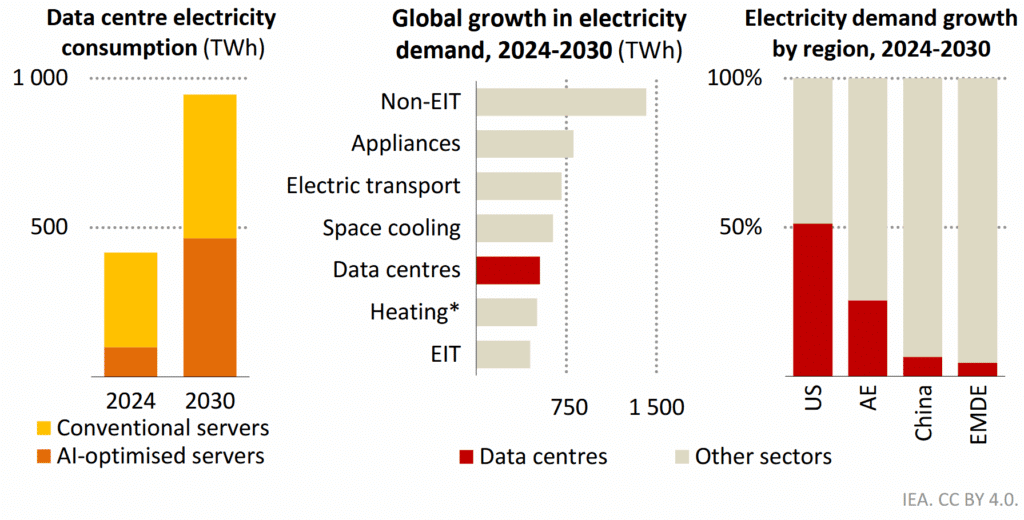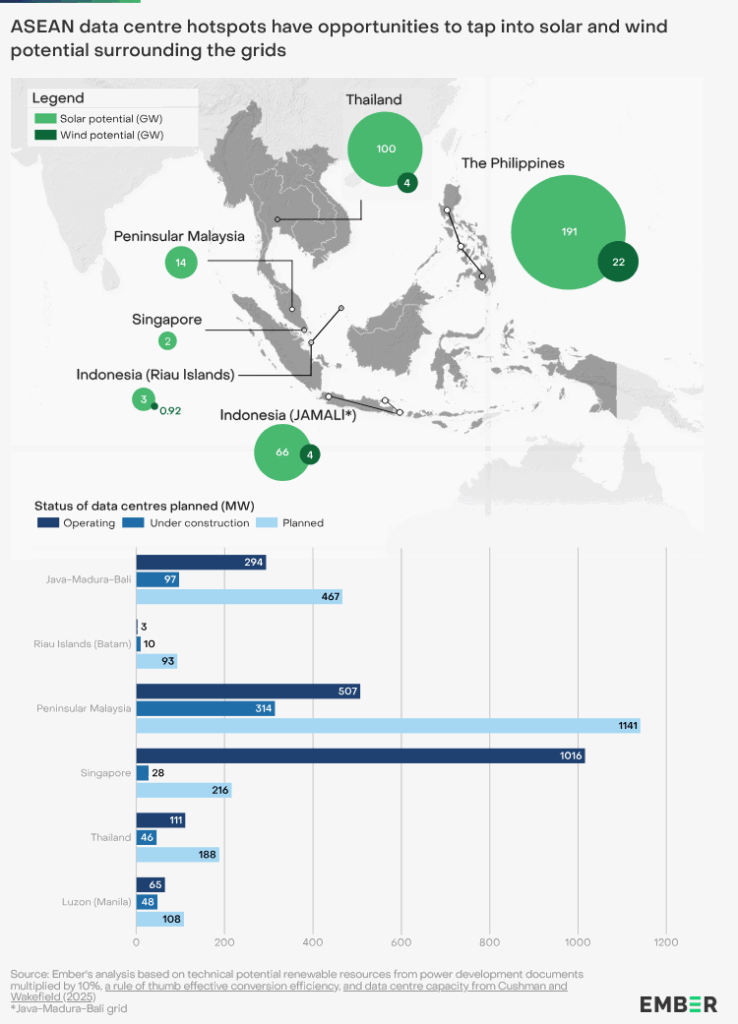Special Focus on AI and Climate Change at COP30
24 November 2025 – by Viktor Tachev
While artificial intelligence wasn’t part of the formal negotiations at COP30 in Brazil, it gained traction in the Action Agenda. Artificial intelligence (AI) has proven invaluable for monitoring the environment and guiding governments and businesses in tackling climate change through various applications, including detecting leaks from oil and gas infrastructure, tracking emission sources, making energy systems more efficient by increasing energy savings, forecasting weather disasters, monitoring changes in biodiversity and more. According to the UNEP, AI could help the world address aspects of the planetary crisis: climate change, nature and biodiversity loss and pollution and waste. Furthermore, the London School of Economics estimates that AI could reduce global greenhouse gas emissions by 3.2-5.4 billion tonnes over the next decade, even accounting for its substantial energy consumption.
On the other hand, researchers from Cornell University note that by 2030, the current rate of AI growth in the US will generate between 24 and 44 million tonnes of CO2 equivalent, which is similar to adding 10 million gasoline cars to the road, or the entire annual emissions of Norway. Currently, the US has more data centres than the following 13 countries combined. With President Donald Trump at the helm of the world’s second-largest polluter and the increasing climate change pushback across the country, the industry’s emissions are poised to continue growing.
Furthermore, some experts argue that, in addition to its passive role in accelerating the climate crisis through its vast energy consumption, AI can also actively worsen climate breakdown, including by optimising fossil fuel production to unlock up to an extra trillion barrels of oil. Unregulated expansion of AI also has the potential to magnify climate change misinformation and disinformation.
All this means that, as a tool, AI can be used to either help solve or exacerbate the climate crisis, and it is up to the governments and corporate stakeholders to decide which path to take.
IEA: The Energy Use of Data Centres and AI Industries to Continue Growing
According to the International Energy Agency (IEA), data centres accounted for around 1.5% of the global electricity consumption in 2024. Their electricity consumption has grown by around 12% per year since 2017, over four times faster than the rate of total electricity consumption, the agency notes.
The World Energy Outlook 2025 report by the IEA projects that the information technology services industry will drive global electricity demand in data centres, with growth averaging 50 TWh per year to 2035. Space cooling and appliances will add another 45 TWh to annual electricity demand in buildings. Electricity use for AI and data centres will also increase energy use in buildings.
In advanced economies, data centres and the growing sectors of digitalisation and AI will be the second-largest electricity demand driver by 2035 after electric vehicles.

Furthermore, the industry puts significant strain on water resources, which can worsen water stress problems in vulnerable regions, the UN warns.
COP30 Brazil: Special Attention to AI and Its Role in Tackling Climate Change
While artificial intelligence wasn’t part of the formal negotiations at COP30, it gained traction in the Action Agenda, which the UN considers crucial for mobilising voluntary climate action from civil society, businesses, investors, cities and states.
According to reports, the topic has received special attention, with the Associated Press reporting that there were at least 24 sessions on AI during the conference’s first week. Among them were events exploring how AI can help cities share energy, AI-backed predictions of forest crime locations, opportunities for digital decarbonisation technologies, advances in data transparency for emissions and a ceremony for the first AI for Climate Action Award, presented to a project on water scarcity and climate variability in Laos.
The first day of COP30 Brazil saw the launch of the Green Digital Action Hub, a global platform to drive a greener, more inclusive digital transformation.
Delegates at COP30 2025 were increasingly exploring how AI could be used to lower, rather than raise, emissions by improving efficiency across high-pollution sectors, including food, transport and energy.
During the “Smarter than the Storm” session, delegates also discussed how AI can help improve climate adaptation, including by enhancing early warning systems to better predict floods, wildfires and landslides and assist local governments in their disaster response efforts.
A coalition of groups, UN bodies and the Brazilian government launched a new global initiative for fostering AI to help developing countries tackle environmental problems called the AI Climate Institute. According to the parties, the program can help educate stakeholders on how to leverage AI to reduce emissions by optimising public transport and agricultural systems, and by making energy grids smarter.
Malawi launched the world’s first AI-verified national platform to track climate action and financing under the Paris Agreement. The system employs advanced digital tools to measure emissions, validate climate projects and record transactions in real time, turning the small country into a global leader in climate governance innovation.
During the summit, environmental groups were increasingly pushing for regulations to soften AI’s ecological footprint, such as mandating public-interest tests for proposed data centres and requiring 100% on-site renewable energy to power them.
Furthermore, South Korea, a global innovation powerhouse that plans to build the world’s first large-scale data centre designed, built and run by AI, made headlines by announcing its intention to join the Powering Past Coal Alliance (PPCA). The country became the first in Asia with an operating coal plant fleet to formally commit to a coal phaseout, putting pressure on other coal-heavy Asian economies and G20 peers.
The commitment means the Korean government will stop building new unabated coal power plants and phase out the majority of the existing and unabated coal power plants by 2040. It follows President Lee Jae Myung’s newly announced economic strategy, which identifies AI, renewable energy and the “energy highway” (a large-scale grid reinforcement initiative) as core national growth engines.
“The shift from coal to clean power is not only essential for the climate. It will also help both the Republic of Korea and all other countries increase our energy security, boost the competitiveness of our businesses and create thousands of jobs in the industries of the future,” said Korea’s Minister of Climate, Energy and Environment, Kim Sung-hwan.
The move followed an opinion poll released earlier this year that showed 99% of mid-market and large-company leaders in South Korea back a move away from coal and other fossil fuels, with over 75% supporting a shift to a renewables-based electricity system by 2035 or sooner.
The announcement demonstrates that advancements in AI and digital innovation can be powered by renewables and don’t have to come at the expense of the planet.
Experts: Renewables Can Meet the Growing Electricity Demand From AI and Data Centre Industries and Unlock Economic Opportunities
According to Ember, the six major economies in ASEAN — Indonesia, Malaysia, the Philippines, Singapore, Thailand and Vietnam — are emerging as the world’s next data centre hot spots. The global digitalisation trends, such as cloud computing and generative AI, open up huge economic opportunities for ASEAN nations. However, they also pose the challenge of meeting the rising demand in a sustainable way.
While the grid across those economies remains dominated by fossil fuels, Ember finds that around 30% of 2030 data centre power demand in most ASEAN countries can be met by solar and wind, even without storage. The experts also identify energy efficiency as another key lever for ASEAN’s data centre decarbonisation.

According to the IEA, investments in efficiency and improved electrification policies are already proving vital for reducing rising energy demand across data centres and the space cooling industries, as seen in Europe and Japan. In fact, the agency considers the growing deployment of artificial intelligence an opportunity to further increase energy efficiency across energy-intensive and non-energy-intensive industries.
‘Greening’ the Data Centre and AI Industries: Possible, Wanted and Necessary, But Requires Policy Interventions
A survey from April 2025 of 1,477 business leaders of mid-market and large organisations with revenues of USD 1 million or more (29% of the respondents were from the IT industry) from 15 global markets, reveals that 97% of executives are overwhelmingly in favour of government action on a rapid clean energy transition and a shift away from fossil fuels. As much as 78% advocate for this to happen within 10 years, as they recognise that delay means missing out on investment, jobs, and growth. Importantly, 52% of business leaders say they will relocate their operations to markets with better access to renewables-based power systems within five years.
As a result, governments have an incentive to prioritise the accelerated deployment of affordable, reliable clean energy not only as a means to accelerate climate action, but also to protect their economic competitiveness, strengthen energy security and guarantee a healthier environment for future generations.
Doing so requires a series of policy interventions. According to Ember, the data centre industry requires a variety of robust, clean power procurement options. The analysts note that the availability of procurement options can improve affordability and expand access to clean power. Across ASEAN nations, Ember identifies stronger policy support for ensuring reliable, sustainable growth aligned with energy transition goals as a key measure to guide green data centre growth.
Such measures should go hand in hand with efforts to mitigate AI’s environmental impact. According to the UNEP, there are five crucial steps on that front, starting with establishing standardised procedures for measuring the ecological impact of AI. Next, governments must develop regulations requiring companies to disclose the direct environmental impacts of AI-based products and services. Governments should also encourage companies to green their data centres, including by using renewable energy and offsetting their carbon emissions. Tech companies also play a significant role, including by making AI algorithms more efficient, reducing their energy use, recycling water and reusing components where feasible. Last but not least, the UNEP advises governments to weave their AI-related policies into their broader environmental regulations.
As noted by UN Secretary-General António Guterres in his opening speech at COP30, we have the solutions to transform our economies and protect our populations. The obstacle is political courage.
by Viktor Tachev
Viktor has years of experience in financial markets and energy finance, working as a marketing consultant and content creator for leading institutions, NGOs, and tech startups. He is a regular contributor to knowledge hubs and magazines, tackling the latest trends in sustainability and green energy.
Read more





